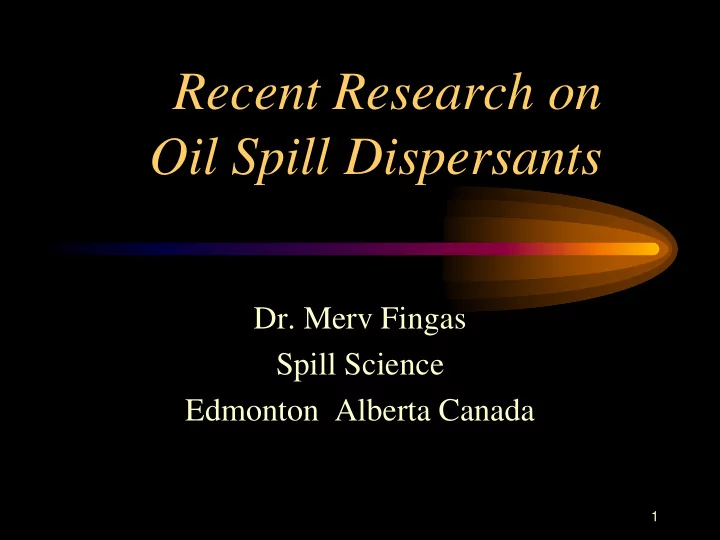

Recent Research on Oil Spill Dispersants Dr. Merv Fingas Spill Science Edmonton Alberta Canada 1
Summary • What is dispersant research • Research since 2010 • Effect of the Deepwater Horizon • Some findings • Better directions? 2
3
Possible Dispersant Research Areas • Interaction with sediment • Toxicity and effects • Application • Basic physical behavior • Fate of dispersed oil • Effects on oil behavior • Molecular interactions • Longevity of dispersion • Benefits vs. effects • Biodegradation • Monitoring • New dispersants • Effectiveness • Human health 4
5
Research Survey • Since 2010 – e.g. since Deepwater Horizon • Found 92 research projects carried out and published in scholarly journals • The only topics covered were toxicity and effects, physical, monitoring, others, biodegradation, and human health • 40% were related to the Deepwater Horizon 6
Division of Research 7
What this says …… • Half of the research carried out studying toxicity and effects of dispersants • Less than half of research carried out as a result or in response to the Deepwater Horizon • Half of research divided equally between other areas studied • Most research areas not studied 8
9
Some results of selected areas • Results are about the same as previous findings 10
Effects studies • Effects studies largely finding out that dispersed oil is more toxic than undispersed, because of the large increase in PAHs in the water column • This depends on life stage of the target organism, eggs, smolts etc. are much more susceptible • (Of course one cannot really get a high concentration of naturally dispersed oil in a test solution) 11
Physical Research • Has largely focused on effects of sediment interaction with oil • Sediment interaction is increased with dispersant and results in increased sedimentation 12
What is not studied • The fact that dispersions are de-stabilized with time, is not being studied • This fact is also largely ignored in other studies – usually because it is difficult to incorporate into studies • Many other aspects not studied as well, e.g. application, effectiveness, etc. etc 13
Monitoring • Many studies on monitoring the dispersant application on Deepwater Horizon • No real conclusions, effectiveness not really determined on both surface and sub-surface applications 14
15
Biodegradation • Scientific studies are again showing that oil biodegradation is about the same or slower with the application of dispersants 16
Human Health Studies • Extensive studies conducted on effects of dispersant application on human health • Results mixed – high doses may have an effect – most research showed that low doses do not have an effect • Yes, more research needed 17
Retrospect • Much of the research in past 3 years was in response to the Deepwater Horizon and addressed immediate situations • No doubt that the research in this area will decline in coming years • Hopefully it will be balanced and focus on some of the areas missed 18
19
Summary • A burst of dispersant research occurred after the Deepwater Horizon spill – much of this research directed at finding the effects or toxicity on certain species 20
New Directions • For the first time there was research on the effects of dispersants on human health – no real results yet 21
22
Recommend
More recommend